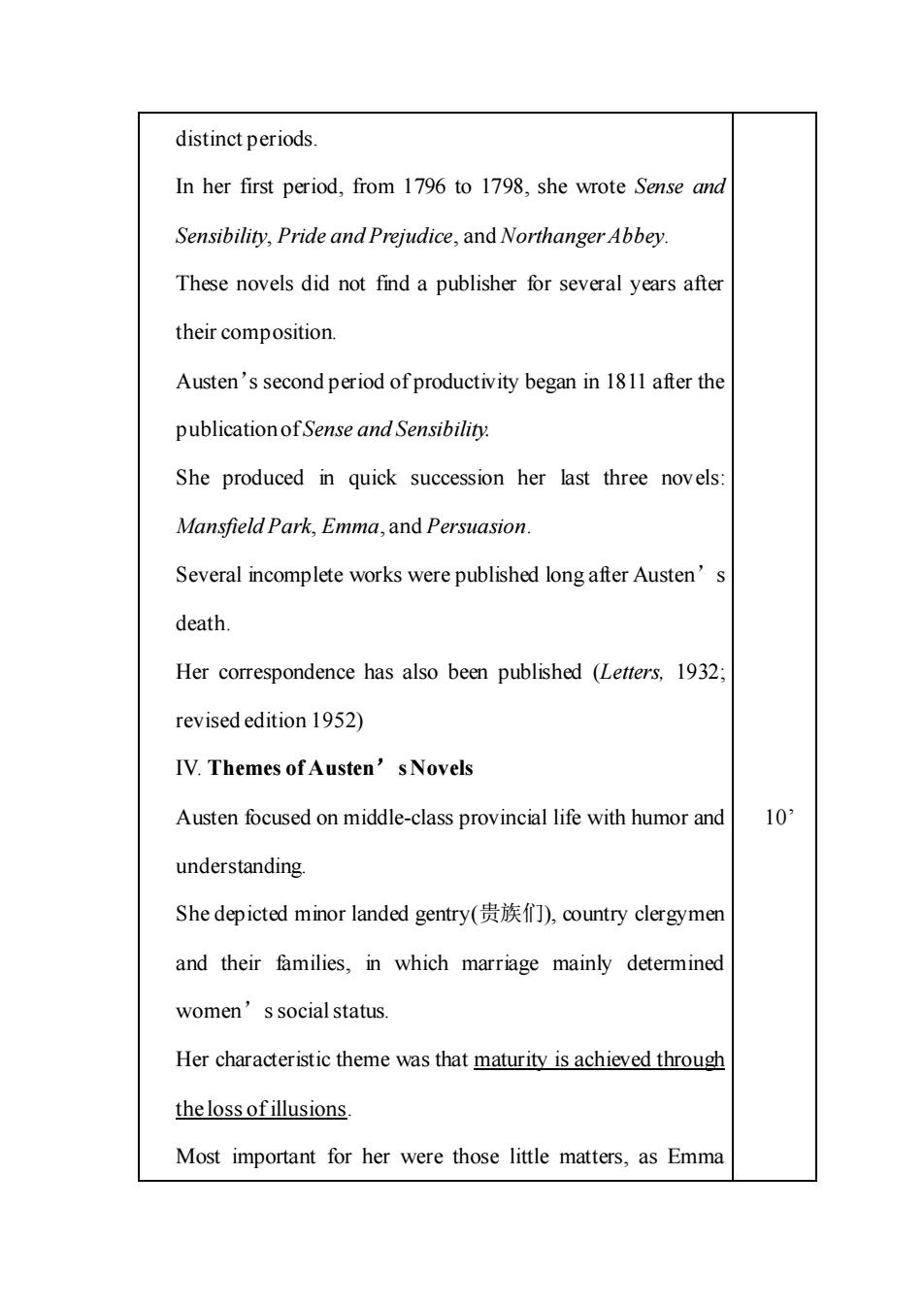
distinct periods In her first period,from 1796 to 1798,she wrote Sense and Sensibility,Pride and Prejudice,and Northanger Abbey. These novels did not find a publisher for several years after their composition. Austen's second period of productivity began in 1811 after the publicationof Sense and Sensibility. She produced in quick succession her last three novels: Mansfield Park,Emma,and Persuasion. Several incomplete works were published long after Austen's death. Her correspondence has also been published (Letters,1932 revised edition 1952) IV.Themes ofAusten's Novels Austen focused on middle-class provincial life with humor and 10 understanding. She depicted minor landed gentry(贵族们),country clergymen and their families,in which marriage mainly determined women's social status. Her characteristic theme was that maturity is achieved through the loss of illusions. Most important for her were those little matters,as Emma
distinct periods. In her first period, from 1796 to 1798, she wrote Sense and Sensibility, Pride and Prejudice, and Northanger Abbey. These novels did not find a publisher for several years after their composition. Austen’s second period of productivity began in 1811 after the publication of Sense and Sensibility. She produced in quick succession her last three novels: Mansfield Park, Emma, and Persuasion. Several incomplete works were published long after Austen’s death. Her correspondence has also been published (Letters, 1932; revised edition 1952) IV. Themes of Austen’s Novels Austen focused on middle-class provincial life with humor and understanding. She depicted minor landed gentry(贵族们), country clergymen and their families, in which marriage mainly determined women’s social status. Her characteristic theme was that maturity is achieved through the loss of illusions. Most important for her were those little matters, as Emma 10’
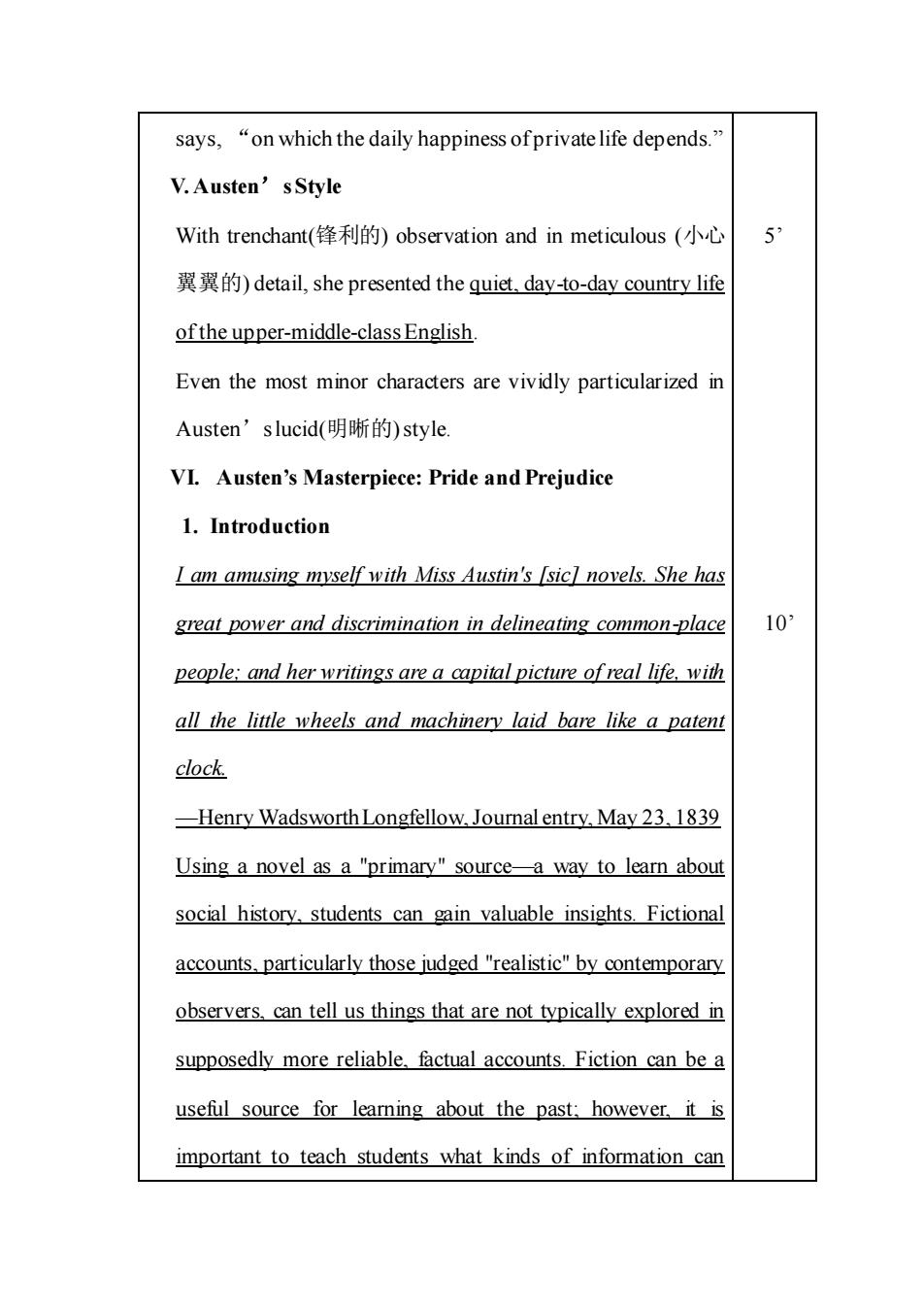
says,"on which the daily happiness ofprivate life depends.' V.Austen'sStyle With trenchant(锋利的)observation and in meticulous(小心 5 翼翼的)detail,she presented the quiet.day-to-day country life of the upper-middle-class English. Even the most minor characters are vividly particularized in Austen’slucid(明晰的)style. VI Austen's Masterpiece:Pride and Prejudice 1.Introduction I am amusing myself with Miss Austin's [sic]novels.She has great power and discrimination in delineating common-place 10 people:and her writings are a capital picture of real life with all the little wheels and machinery laid bare like a patent clock. -Henry Wadsworth Longfellow,Journal entry May 23.1839 Using a novel as a "primary"sourcea way to learn about social history,students can gain valuable insights Fictional accounts,particularly those judged "realistic"by contemporary observers,can tell us things that are not typically explored in supposedly more reliable factual accounts.Fiction can be a useful source for learning about the past:however,it is important to teach students what kinds of information can
says, “on which the daily happiness of private life depends.” V. Austen’s Style With trenchant(锋利的) observation and in meticulous (小心 翼翼的) detail, she presented the quiet, day-to-day country life of the upper-middle-class English. Even the most minor characters are vividly particularized in Austen’s lucid(明晰的) style. VI. Austen’s Masterpiece: Pride and Prejudice 1. Introduction I am amusing myself with Miss Austin's [sic] novels. She has great power and discrimination in delineating common-place people; and her writings are a capital picture of real life, with all the little wheels and machinery laid bare like a patent clock. —Henry Wadsworth Longfellow, Journal entry, May 23, 1839 Using a novel as a "primary" source—a way to learn about social history, students can gain valuable insights. Fictional accounts, particularly those judged "realistic" by contemporary observers, can tell us things that are not typically explored in supposedly more reliable, factual accounts. Fiction can be a useful source for learning about the past; however, it is important to teach students what kinds of information can 5’ 10’
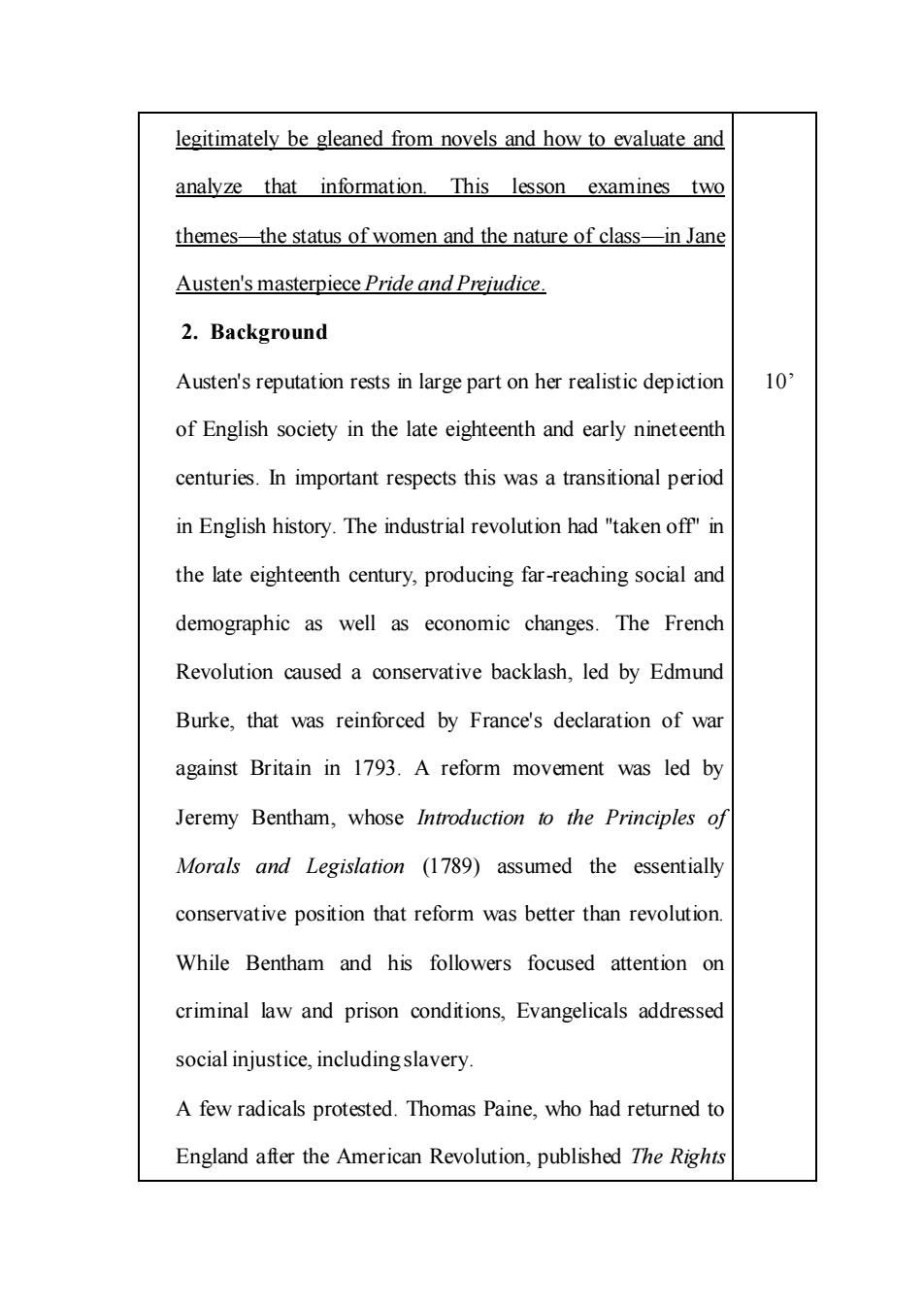
legitimately be gleaned from novels and how to evaluate and analyze that information.This lesson examines two themesthe status of women and the nature of class-in Jane Austen's masterpiece Pride and Prejudice. 2.Background Austen's reputation rests in large part on her realistic depiction 10, of English society in the late eighteenth and early nineteenth centuries.In important respects this was a transitional period in English history.The industrial revolution had "taken off"in the late eighteenth century,producing far-reaching social and demographic as well as economic changes.The French Revolution caused a conservative backlash,led by Edmund Burke,that was reinforced by France's declaration of war against Britain in 1793.A reform movement was led by Jeremy Bentham,whose Introduction to the Principles of Morals and Legislation (1789)assumed the essentially conservative position that reform was better than revolution While Bentham and his followers focused attention on criminal law and prison conditions,Evangelicals addressed social injustice,includingslavery A few radicals protested.Thomas Paine,who had returned to England after the American Revolution,published The Rights
legitimately be gleaned from novels and how to evaluate and analyze that information. This lesson examines two themes—the status of women and the nature of class—in Jane Austen's masterpiece Pride and Prejudice. 2. Background Austen's reputation rests in large part on her realistic depiction of English society in the late eighteenth and early nineteenth centuries. In important respects this was a transitional period in English history. The industrial revolution had "taken off" in the late eighteenth century, producing far-reaching social and demographic as well as economic changes. The French Revolution caused a conservative backlash, led by Edmund Burke, that was reinforced by France's declaration of war against Britain in 1793. A reform movement was led by Jeremy Bentham, whose Introduction to the Principles of Morals and Legislation (1789) assumed the essentially conservative position that reform was better than revolution. While Bentham and his followers focused attention on criminal law and prison conditions, Evangelicals addressed social injustice, including slavery. A few radicals protested. Thomas Paine, who had returned to England after the American Revolution, published The Rights 10’
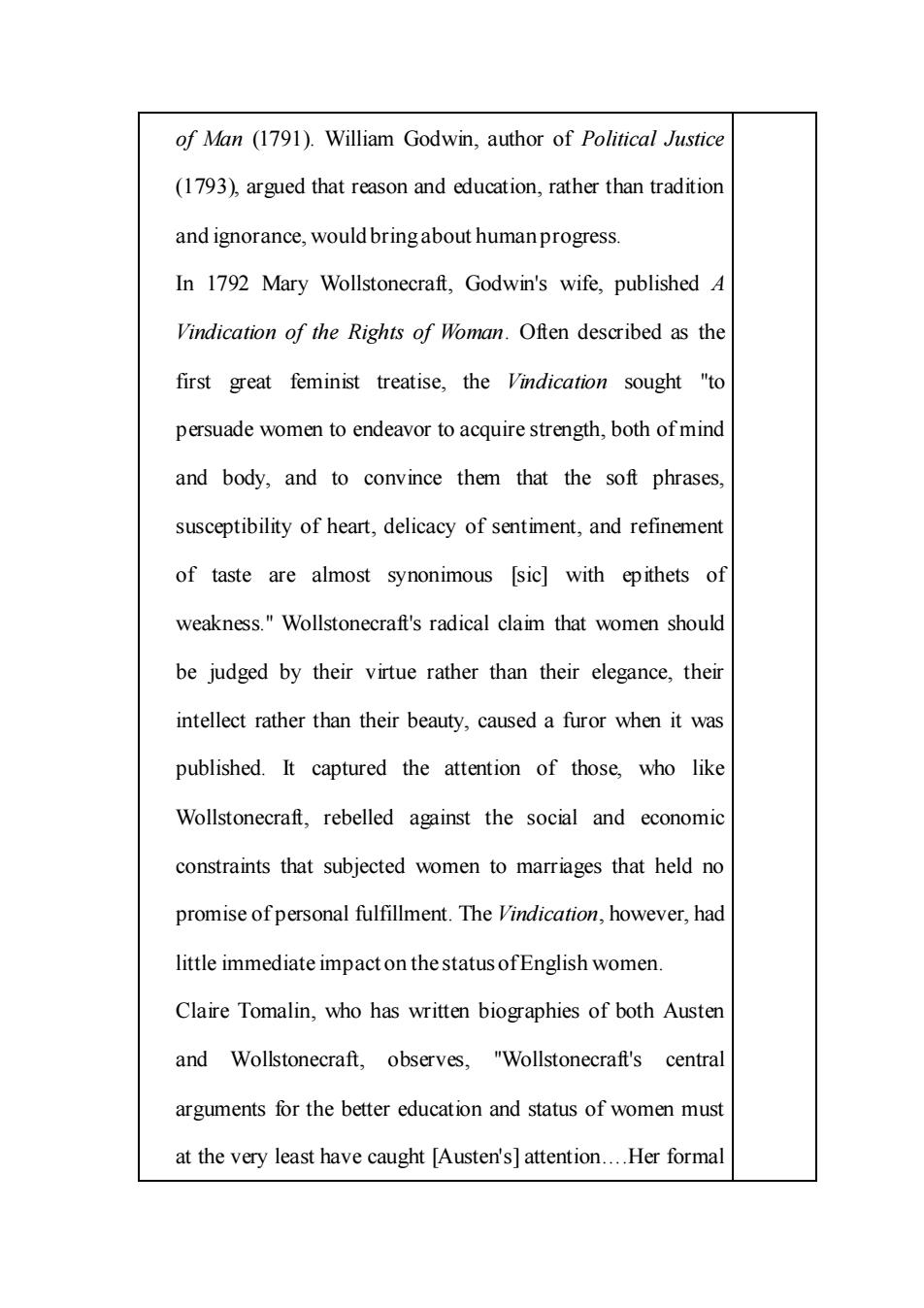
of Man (1791).William Godwin,author of Political Justice (1793),argued that reason and education,rather than tradition and ignorance,would bring about human progress. In 1792 Mary Wollstonecraft,Godwin's wife,published A Vindication of the Rights of Woman.Often described as the first great feminist treatise,the Vindication sought "to persuade women to endeavor to acquire strength,both of mind and body,and to convince them that the soft phrases. susceptibility of heart,delicacy of sentiment,and refinement of taste are almost synonimous [sic]with epithets of weakness."Wollstonecraft's radical claim that women should be judged by their virtue rather than their elegance,their intellect rather than their beauty,caused a furor when it was published.It captured the attention of those,who like Wollstonecraf,rebelled against the social and economic constraints that subjected women to marriages that held no promise of personal fulfillment.The Vindication,however,had little immediate impact on the status ofEnglish women. Claire Tomalin,who has written biographies of both Austen and Wollstonecraft,observes,"Wollstonecraft's central arguments for the better education and status of women must at the very least have caught [Austen's]attention.Her formal
of Man (1791). William Godwin, author of Political Justice (1793), argued that reason and education, rather than tradition and ignorance, would bring about human progress. In 1792 Mary Wollstonecraft, Godwin's wife, published A Vindication of the Rights of Woman. Often described as the first great feminist treatise, the Vindication sought "to persuade women to endeavor to acquire strength, both of mind and body, and to convince them that the soft phrases, susceptibility of heart, delicacy of sentiment, and refinement of taste are almost synonimous [sic] with epithets of weakness." Wollstonecraft's radical claim that women should be judged by their virtue rather than their elegance, their intellect rather than their beauty, caused a furor when it was published. It captured the attention of those, who like Wollstonecraft, rebelled against the social and economic constraints that subjected women to marriages that held no promise of personal fulfillment. The Vindication, however, had little immediate impact on the status of English women. Claire Tomalin, who has written biographies of both Austen and Wollstonecraft, observes, "Wollstonecraft's central arguments for the better education and status of women must at the very least have caught [Austen's] attention.Her formal
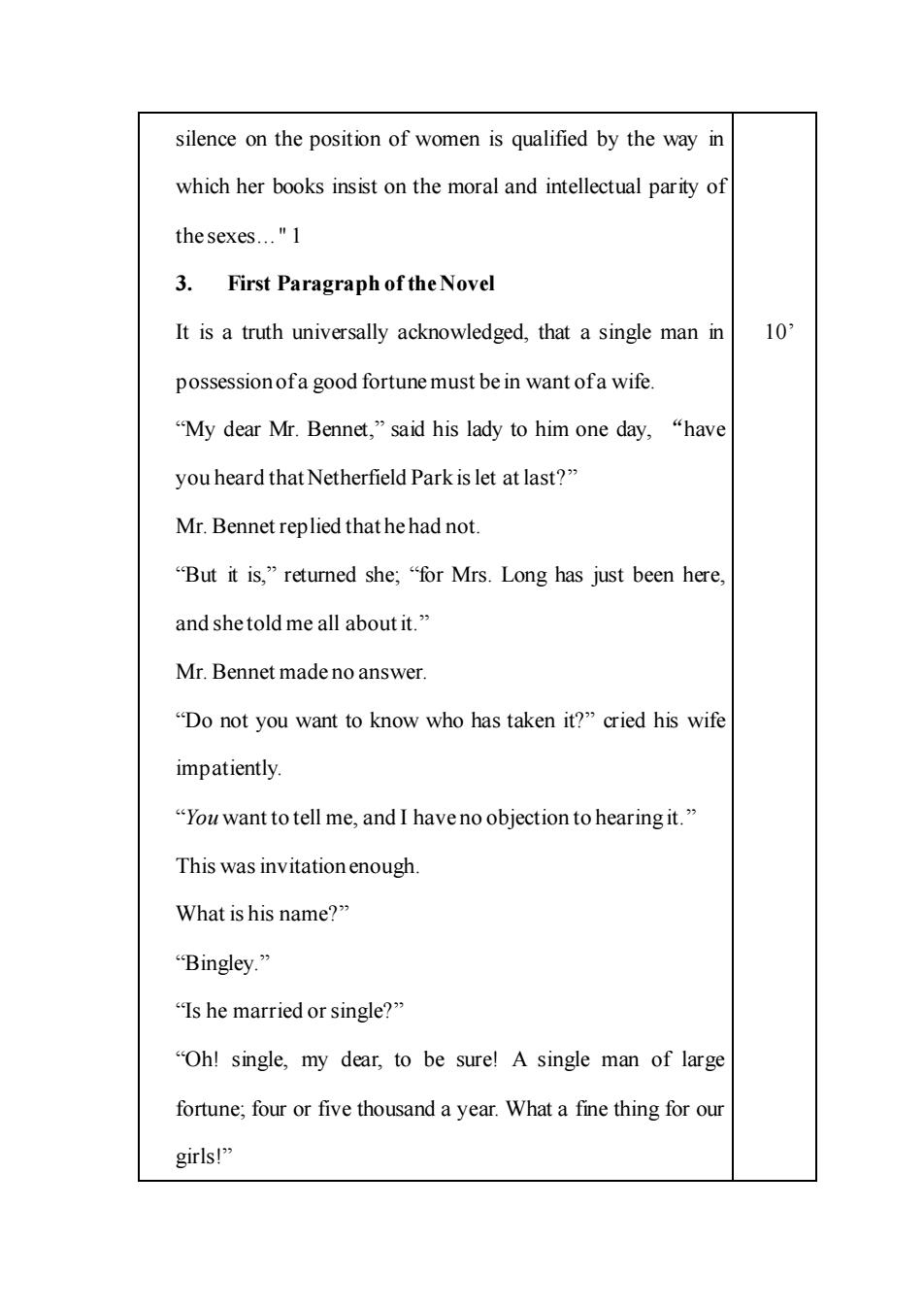
silence on the position of women is qualified by the way in which her books insist on the moral and intellectual parity of thesexes."1 3.First Paragraph of the Novel It is a truth universally acknowledged,that a single man in 10 possessionofa good fortune must be in want ofa wife. "My dear Mr.Bennet,"said his lady to him one day,"have you heard that Netherfield Park is let at last?" Mr.Bennet replied thathehad not. "But it is,"returned she;"for Mrs.Long has just been here, and shetold me all about it." Mr.Bennet made no answer. "Do not you want to know who has taken it?"cried his wife impatiently. "You want to tell me,and I haveno objection to hearing it." This was invitation enough What is his name?" Bingley.” "Is he married or single?" "Oh!single,my dear,to be sure!A single man of large fortune;four or five thousand a year.What a fine thing for our girls!
silence on the position of women is qualified by the way in which her books insist on the moral and intellectual parity of the sexes." 1 3. First Paragraph of the Novel It is a truth universally acknowledged, that a single man in possession of a good fortune must be in want of a wife. “My dear Mr. Bennet,” said his lady to him one day, “have you heard that Netherfield Park is let at last?” Mr. Bennet replied that he had not. “But it is,” returned she; “for Mrs. Long has just been here, and she told me all about it.” Mr. Bennet made no answer. “Do not you want to know who has taken it?” cried his wife impatiently. “You want to tell me, and I have no objection to hearing it.” This was invitation enough. What is his name?” “Bingley.” “Is he married or single?” “Oh! single, my dear, to be sure! A single man of large fortune; four or five thousand a year. What a fine thing for our girls!” 10’